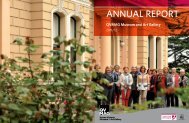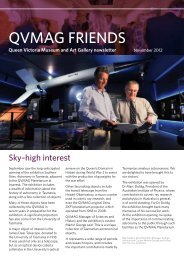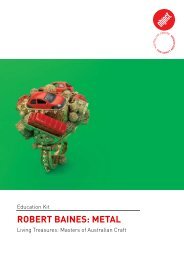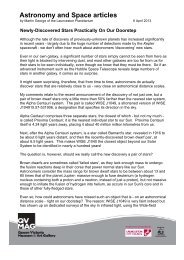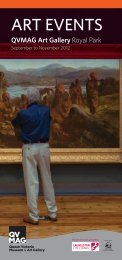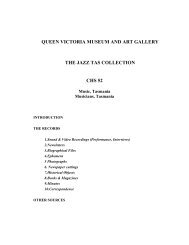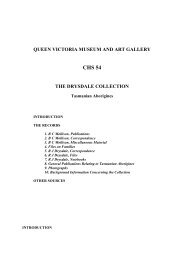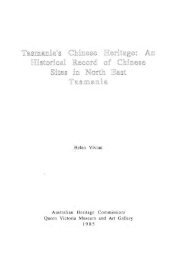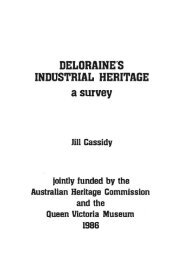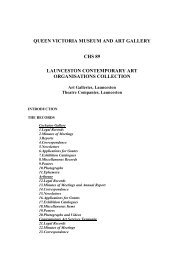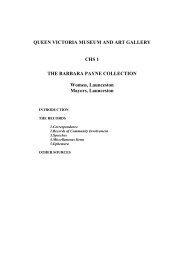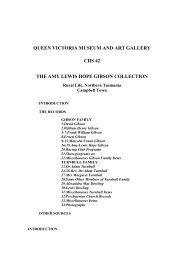Wattle Grove Press was a small publishing house established in ...
Wattle Grove Press was a small publishing house established in ...
Wattle Grove Press was a small publishing house established in ...
Create successful ePaper yourself
Turn your PDF publications into a flip-book with our unique Google optimized e-Paper software.
<strong>Wattle</strong> <strong>Grove</strong> <strong>Press</strong> <strong>was</strong> a <strong>small</strong> <strong>publish<strong>in</strong>g</strong> <strong>house</strong> <strong>established</strong><br />
<strong>in</strong> Launceston by Professor Rolf Hennequel <strong>in</strong> 1958. The<br />
bus<strong>in</strong>ess <strong>was</strong> similar to many founded worldwide around that<br />
time, as a response to the dom<strong>in</strong>ation of large publishers who<br />
were unwill<strong>in</strong>g to pr<strong>in</strong>t less ma<strong>in</strong>stream titles.<br />
Rolf Hennequel, writ<strong>in</strong>g <strong>in</strong> 1965, stated that the <strong>Press</strong> <strong>was</strong><br />
founded:<br />
. . . for pr<strong>in</strong>t<strong>in</strong>g unusual literature, which could not possibly be<br />
launched commercially. This <strong>was</strong>—and is—our only purpose,<br />
which also <strong>in</strong>cludes the desire to assist young writers. Our sole<br />
self-imposed condition <strong>was</strong> that the venture should support itself.<br />
This, with the help of devoted staff, it has done up to date. Our<br />
books have been made without any assistance, governmental or<br />
otherwise, and this <strong>was</strong> possible only through the faithful<br />
support of a number of librarians and collectors, and a handful<br />
of bookshops, all united <strong>in</strong> what we call: ‘The Friends of the<br />
<strong>Wattle</strong> <strong>Grove</strong> <strong>Press</strong>.<br />
<strong>Wattle</strong> <strong>Grove</strong> <strong>Press</strong> published 22 titles of limited edition books<br />
between 1958 and 1968. They <strong>in</strong>cluded works of Australian and<br />
Tasmanian poetry, Australian fiction, and Mexican and German<br />
poetry. Authors published <strong>in</strong>cluded Pat Flower, Rodney Hall,<br />
Dorothy Hewett, Wilhelm He<strong>in</strong>er and Marguerite Harris. As well as<br />
<strong>publish<strong>in</strong>g</strong> works by avant-garde and young authors, it enabled the<br />
publication of ten of Hennequel’s own writ<strong>in</strong>gs under the name of<br />
Alb<strong>in</strong> Eiger, and three <strong>in</strong> the name of Rolf Hennequel.<br />
It <strong>was</strong> an <strong>in</strong>novative local <strong>in</strong>dustry, us<strong>in</strong>g experimental pr<strong>in</strong>t<strong>in</strong>g<br />
and b<strong>in</strong>d<strong>in</strong>g techniques to publish the work of young and<br />
emerg<strong>in</strong>g writers. Hennequel used a 100-year-old platen press to<br />
produce books which often had a dist<strong>in</strong>ctive, and very often, bold<br />
appearance. Hennequel did not, however, believe that the pr<strong>in</strong>t<strong>in</strong>g<br />
and b<strong>in</strong>d<strong>in</strong>g were more important than the content. It does appear<br />
that <strong>Wattle</strong> <strong>Grove</strong> <strong>Press</strong>’ overseas buyers were more complimentary<br />
about its books than were the Australian collectors and libraries.<br />
The name, <strong>Wattle</strong> <strong>Grove</strong> <strong>Press</strong>, <strong>was</strong> <strong>in</strong>spired by the wattles which<br />
grew on Hennequel’s property at Newnham. The <strong>Press</strong> ceased<br />
operation <strong>in</strong> 1968 as Hennequel’s poor health prevented him from<br />
cont<strong>in</strong>u<strong>in</strong>g.<br />
Rolf Hennequel <strong>in</strong> Calcutta,1951<br />
Photo: Tasmaniana Library
The Professor <strong>in</strong> Afghanistan<br />
Caricature drawn by Abdullah<br />
Breshna (one of Hennequel’s<br />
students)<br />
Kabul,c.1950<br />
Photo: Tasmaniana Library<br />
ROLF HENNEQUEL (Henkl)<br />
Born <strong>in</strong> Vienna <strong>in</strong> 1895, Hennequel moved to Launceston <strong>in</strong> 1952<br />
where he lived and worked at the home he built at Newnham.<br />
Hennequel,who <strong>was</strong> of French descent, studied and taught the<br />
science of language (philology) and l<strong>in</strong>guistics, Lat<strong>in</strong>, French and<br />
art. He had a strong <strong>in</strong>terest <strong>in</strong> the languages and cultures of<br />
Europe and Asia and studied <strong>in</strong> the USA, Cairo and Athens. He<br />
lived and worked <strong>in</strong> Tokyo, India, Afghanistan and f<strong>in</strong>ally<br />
Tasmania. He <strong>was</strong> a strong man with a passion for languages. This<br />
led him to become fluent <strong>in</strong> French, German, Italian and Russian,<br />
with some knowledge of Japanese.<br />
He <strong>was</strong> deeply <strong>in</strong>fluenced by his time <strong>in</strong> Afghanistan, with many of<br />
his teach<strong>in</strong>gs <strong>in</strong> Tasmania conta<strong>in</strong><strong>in</strong>g photographs of artefacts and<br />
places,taken dur<strong>in</strong>g his stay <strong>in</strong> that country. Many of his art<br />
history lectures drew heavily on this material.<br />
He published a number of titles on philology and l<strong>in</strong>guistics, along<br />
with papers on the sculpture and architecture of Afghanistan,<br />
antiquities, and even extended to sport and the art of fenc<strong>in</strong>g.<br />
While <strong>in</strong> Launceston Hennequel taught at Scotch College,<br />
Launceston Church Grammar School and with the Adult<br />
Education program. He pa<strong>in</strong>ted and sculpted and participated <strong>in</strong><br />
local art exhibitions.<br />
Hennequel died <strong>in</strong> 1971, after a period of ill-health.
‘Eastward. A Pilgrimage—This collection of free verse,<br />
w<strong>in</strong>nowed from a harvest of forty years is the author’s life work<br />
and message:a record of his undaunted wander<strong>in</strong>gs through<br />
Europe and Asia, and of his approach to the ideals of the East,set<br />
aga<strong>in</strong>st the background of India and Ch<strong>in</strong>a, Japan and<br />
Afghanistan. Only a few copies rema<strong>in</strong> of a limited edition of fifty.<br />
In flexible cover. £5.0.0: also <strong>in</strong> a leather folder, bound <strong>in</strong> silk cord<br />
<strong>in</strong> the style of the Imperial M<strong>in</strong>g manuscripts.£10, and the same,<br />
illustrated by numerous draw<strong>in</strong>gs (orig<strong>in</strong>als) and photographs,<br />
£20.’<br />
Source: Advertis<strong>in</strong>g flyer for <strong>Wattle</strong> <strong>Grove</strong> <strong>Press</strong>
‘Paris. An essay—A causerie on features of life <strong>in</strong> this most<br />
cultivated and cultured of all cities, witty, profound and even<br />
sentimental: “a rhapsody <strong>in</strong> praise, dispraise and illum<strong>in</strong>ation of that<br />
enigmatic city . . . not a guidebook, but a fairly comprehensive<br />
impression . . . with one memory crowd<strong>in</strong>g upon another. Eiger conveys<br />
an illusion of swift and excit<strong>in</strong>g movement” (Douglas Stewart <strong>in</strong> The<br />
Bullet<strong>in</strong>, Sydney). Suitable as a gift.2gns.’<br />
Source: Advertis<strong>in</strong>g flyer for <strong>Wattle</strong> <strong>Grove</strong> <strong>Press</strong>
List of titles published by <strong>Wattle</strong> <strong>Grove</strong> <strong>Press</strong> 1958-68<br />
1958 The young god Ant<strong>in</strong>ous. A<br />
study <strong>in</strong> portraiture. Alb<strong>in</strong><br />
Eiger. 12 copies numbered<br />
and <strong>in</strong>itialled.<br />
1958 Ant<strong>in</strong>ous the young god.<br />
Alb<strong>in</strong> Eiger.<br />
65 copies numbered and<br />
<strong>in</strong>itialled.<br />
1958 Eastward. A travelogue <strong>in</strong><br />
verse. Alb<strong>in</strong> Eiger.<br />
16 copies numbered and<br />
<strong>in</strong>itialled.<br />
1959 Eastward. Collected poems.<br />
Alb<strong>in</strong> Eiger.<br />
50 copies numbered and<br />
<strong>in</strong>itialled.<br />
1960 The swallow flower: poems.<br />
Alb<strong>in</strong> Eiger.<br />
30 copies numbered and<br />
<strong>in</strong>itialled.<br />
1960 Paris. Alb<strong>in</strong> Eiger.<br />
300 copies numbered and<br />
<strong>in</strong>itialled. (see book no.1)<br />
1960 Vox Populi. A collection of<br />
praise and slander...(A<br />
publicity pamphlet which<br />
<strong>was</strong> repr<strong>in</strong>ted at <strong>in</strong>tervals.)<br />
1961 The young god Ant<strong>in</strong>ous.<br />
Alb<strong>in</strong> Eiger.<br />
50 copies numbered and<br />
<strong>in</strong>itialled. Second pr<strong>in</strong>t<strong>in</strong>g.<br />
1961 Solitaries. Alb<strong>in</strong> Eiger.<br />
1000 copies.<br />
(see book no.2)<br />
1961 Red on purple. A dream of<br />
the ancient world.<br />
Alb<strong>in</strong> Eiger<br />
300 numbered and<br />
<strong>in</strong>itialled copies.<br />
(see book no.3)<br />
1962 A short history of the <strong>Wattle</strong><br />
<strong>Grove</strong> <strong>Press</strong>.<br />
Rolf Hennequel.<br />
1962 Three Aegyptian stories.<br />
Alb<strong>in</strong> Eiger.<br />
100 numbered and<br />
<strong>in</strong>itialled copies.<br />
(see book no.4)<br />
1962 Encounter with<br />
Hofmannsthal.<br />
Rolf Hennequel.<br />
50 copies numbered and<br />
<strong>in</strong>itialled. (see book no.5)<br />
1963 In Capricornia. Po<strong>in</strong>tless<br />
exotic ballads. Alb<strong>in</strong> Eiger.<br />
205 copies numbered and<br />
<strong>in</strong>itialled. (see book no.6)<br />
1963 Forty beads on a hangman’s<br />
rope. Fragments of<br />
memory. Rodney Hall.<br />
220 numbered and signed<br />
copies.(see book no.7)<br />
1963 Pistils for two. Pat Flower.<br />
220 copies numbered and<br />
signed.(see book no.8)
1964 Narcissus and Echo.<br />
Rolf Hennequel.<br />
35 copies numbered and<br />
<strong>in</strong>itialled. (see book no.9)<br />
1964 On the ru<strong>in</strong>s of Babylon<br />
with Tiresias. Marcanthony<br />
Montes de Oca.<br />
100 copies numbered and<br />
<strong>in</strong>itialled.<br />
1964 Eastward. (Revised ed.)<br />
Alb<strong>in</strong> Eiger.<br />
100 copies numbered and<br />
<strong>in</strong>tialled. (see book no.10)<br />
1964 Four tales from Byzantium.<br />
Howard Mitcham.<br />
150 copies numbered.<br />
(see book no.11)<br />
1964 Stella Matut<strong>in</strong>a. A cycle of<br />
twenty-one poems by<br />
Alb<strong>in</strong> Eiger.<br />
60 copies numbered and<br />
<strong>in</strong>itialled. (see book no.12)<br />
1965 Symbols and book<br />
decorations of the <strong>Wattle</strong><br />
<strong>Grove</strong> <strong>Press</strong>.<br />
50 copies numbered and<br />
<strong>in</strong>itialled. (see book no.13)<br />
1965 The risk of the v<strong>in</strong>e. Poems<br />
by Marguerite Harris.<br />
150 copies numbered and<br />
<strong>in</strong>itialled.<br />
1966 South Africa. A cycle of<br />
thirty poems by<br />
Wilhelm Hiener<br />
100 copies numbered and<br />
<strong>in</strong>itialled. (see book no.14)<br />
1966 Petra. Rolf Hennequel.<br />
100 numbered and<br />
<strong>in</strong>itialled copies.<br />
1966 Ambigamus. “The logic<br />
box”. Ed. by Philip Ward.<br />
21 copies numbered and<br />
signed.<br />
1967 Eastward. A pilgrimage <strong>in</strong><br />
68 cantos. Alb<strong>in</strong> Eiger.<br />
150 copies numbered and<br />
<strong>in</strong>itialled.<br />
1967 Hidden journey. Poems.<br />
Dorothy Hewett.<br />
100 numbered and signed<br />
copies.(see book no.15)<br />
1968 Nippon. A poem.<br />
Alb<strong>in</strong> Eiger.<br />
65 copies numbered and<br />
<strong>in</strong>itialled. (see book no.16)<br />
1968 Late night bullet<strong>in</strong>.<br />
Dorothy Hewett.<br />
100 numbered and signed<br />
copies.(see book no.17)
‘Solitaries—A collection of stories describ<strong>in</strong>g extraord<strong>in</strong>ary<br />
“lives”—the <strong>in</strong>flexible ascetic from Thebaid and the visionary<br />
escapist dwell<strong>in</strong>g under a Roman arch on African soil; the sa<strong>in</strong>t on<br />
the column and Mussol<strong>in</strong>i with his double; the stuffed Caesar and<br />
the bewildered foreigner <strong>in</strong> Afghanistan;a caricature of Tokyo;<br />
and bewitched identical tw<strong>in</strong>s. All the tragedies and glories of<br />
these “lives” were not only <strong>in</strong>vented, but also lived.’<br />
Source: Advertis<strong>in</strong>g flyer for <strong>Wattle</strong> <strong>Grove</strong> <strong>Press</strong>
‘Red on Purple—A Dream of the Ancient world. This is a<br />
vision, horrible, but elat<strong>in</strong>g, of the exceptional circumstances<br />
which offered a scholarly young Roman, Narcissus of Clusium the<br />
opportunity to take revenge on the tyrant who had persecuted his<br />
<strong>house</strong>. This story is set <strong>in</strong> the period of twilight,when old and new<br />
creeds fused and coexisted. The beauties and the cruelties of the<br />
classical world pass before the eyes of the reader, <strong>in</strong> an atmosphere<br />
of profound irony,—often like <strong>in</strong> a play, presided over by both the<br />
p<strong>in</strong>k and the iron masks.’<br />
1962.RED ON PURPLE.A Dream of the Ancient world<br />
Mary Renaud (a Friend of WGP, author of The K<strong>in</strong>g Must Die),<br />
says about RED ON PURPLE: This richly decorated, <strong>in</strong>genious<br />
fantasy of the Roman world has a remarkable, almost narcotic<br />
quality which sends one to De Qu<strong>in</strong>cey or Salammbo <strong>in</strong> search of<br />
its aff<strong>in</strong>ities. It is a book whose scenes and images recur long<br />
afterwards <strong>in</strong> the m<strong>in</strong>d.”<br />
Source: Advertis<strong>in</strong>g flyer for <strong>Wattle</strong> <strong>Grove</strong> <strong>Press</strong>
‘Solitaries<br />
These eight stories by ALBIN EIGER, collected <strong>in</strong> a volume handpr<strong>in</strong>ted<br />
at the <strong>Wattle</strong> <strong>Grove</strong> <strong>Press</strong>, Newnham, Tasmania, have been<br />
described as “Symbolist”,“Existentialist”,“Surrealist”,<br />
“Experimentalist”,“Avant-gardist”, and also as “Dream Stories”,<br />
“fantasies”,“Scholarly Subtle Comedies”,“Sophisticated Satires”,<br />
and “Delightfully Witty”.’<br />
‘WHAT ARE THEY?<br />
[P. R. Stephenson, <strong>in</strong> a critique <strong>in</strong>cluded <strong>in</strong> the volume, states]:<br />
“Alb<strong>in</strong> Eiger’s stories present stylistic <strong>in</strong>novations, and an<br />
orig<strong>in</strong>ality of conceptual context,which make them a wide<br />
departure from the norms of admass culture . . . His visions of<br />
antiquity come through with the vividness of a dream walk<strong>in</strong>g . . .<br />
The verisimilitude is startl<strong>in</strong>g. This, with his Gallic wit and<br />
philological precision of phrase, put these SOLITARIES <strong>in</strong> a class<br />
by themselves, as the expression of an <strong>in</strong>dividualistic,<br />
unregimented, and venturesome m<strong>in</strong>d”.’<br />
Source: Advertis<strong>in</strong>g flyer for <strong>Wattle</strong> <strong>Grove</strong> <strong>Press</strong>
SOLITARIES<br />
Alb<strong>in</strong> Eiger calls his SOLITARIES jok<strong>in</strong>gly “exotic po<strong>in</strong>tless<br />
stories”. Exotic they are* and the po<strong>in</strong>ts do not obtrude, though<br />
one f<strong>in</strong>ds them,rather as one f<strong>in</strong>ds the lost needle <strong>in</strong> the chair<br />
seat.<br />
SOLITARIES have the <strong>in</strong>evitability, the logic of a dream from<br />
which one wakes laugh<strong>in</strong>g. Subtle, witty, wry, surrealist comments<br />
on the absurdity of human behaviour, they are shot through with<br />
flashes of recognition—swift, sure-f<strong>in</strong>gered imagery that evokes<br />
the atmosphere of a country, the essence of its people. The fruitand-dr<strong>in</strong>k<br />
seller mov<strong>in</strong>g between the kneel<strong>in</strong>g worshippers <strong>in</strong><br />
medieval France,a frosty Roman moon gl<strong>in</strong>t<strong>in</strong>g on icicles on the<br />
Trevi founta<strong>in</strong>,a trail of sun-glassed, camera-hung tourists on the<br />
Piazza <strong>in</strong> Capri—even a modest globe-trotter will recognise these<br />
with nostalgia. But more tenacious <strong>in</strong> the memory will be the<br />
pictures of a hermit <strong>in</strong> the African desert,a mound of chew<strong>in</strong>ggum<br />
wads beside him, and a flutter of p<strong>in</strong>k “veneration-tickets”<br />
float<strong>in</strong>g down on the Imperial Palace of an Eastern Capital.<br />
There is no category <strong>in</strong>to which Alb<strong>in</strong> Eiger’s writ<strong>in</strong>g can be<br />
placed automatically. Each of these stories is <strong>in</strong>dividual; each has<br />
its own validity and <strong>in</strong>tegrity. They are reward<strong>in</strong>g always;some of<br />
them are pure delight.<br />
DOROTHY BLEWETT<br />
(Melbourne)<br />
* seen from the West; but the author ma<strong>in</strong>ta<strong>in</strong>s that Australia is<br />
even more exotic, and life (anywhere) even more po<strong>in</strong>tless than his<br />
stories! (W.G.P.)
‘All books from our press are limited, illustrated<br />
and bound by hand, and exhibit the advantages—<br />
and also disadvantages—which work of this k<strong>in</strong>d<br />
is thought to possess <strong>in</strong> the mach<strong>in</strong>e age . . .’
1963. Rodney Hall (Brisbane): FORTY BEADS ON<br />
A HANGMAN’S ROPE. Fragments of memory<br />
(Poems).<br />
Rodney Hall’s poems are of a k<strong>in</strong>d which grow on us: perfected<br />
like sculptures <strong>in</strong> the round, each with a surpris<strong>in</strong>gly and<br />
unmistakably <strong>in</strong>dividualistic turn, never sentimental and always<br />
of cultural depth. They are autobiographical: the “rope” is a<br />
symbol of life, of the noose slipped over our heads by society.
PAT FLOWER: Pistils for Two.<br />
“These trivial verses are straight out of the author’s deep unconsciousness.<br />
It is only because her m<strong>in</strong>d is so shallow that the<br />
verses are not even deeper. Experience teaches us all someth<strong>in</strong>g;<br />
perhaps one day it will teach the author of PISTILS FOR TWO that<br />
she has no stamen power. Pat’s j<strong>in</strong>gles look light, but they are read<br />
compla<strong>in</strong>ts aga<strong>in</strong>st the dire fate of modern man who has not<br />
evolved a satisfactory formula for liv<strong>in</strong>g—except <strong>in</strong> poetry!”
1963. Alb<strong>in</strong> Eiger (Tasmania): IN CAPRICORNIA.<br />
Po<strong>in</strong>tless Exotic Ballads.<br />
A “Friend of the WGP” says: “In Capricornia” is sub-titled:<br />
“Po<strong>in</strong>tless Exotic Ballads”. The polygot nature of the verse,rang<strong>in</strong>g<br />
over a wide section of world civilization,might account for the<br />
word “exotic”, but po<strong>in</strong>tless the book certa<strong>in</strong>ly is not. Here we have<br />
a high-spirited attack on Australian complacency: The collection<br />
starts with a magic view of the land (“the holy striated pla<strong>in</strong>”),<br />
dous<strong>in</strong>g it with cold reflection (“here where I built my home /<br />
Without ever hav<strong>in</strong>g handled tools before”). Other poems deal<br />
with: Aborig<strong>in</strong>al magic (the “s<strong>in</strong>g<strong>in</strong>g to death”); with the latest<br />
Melbourne Sa<strong>in</strong>t, the <strong>in</strong>ventor of the espresso mach<strong>in</strong>e; with social<br />
<strong>in</strong>ertia <strong>in</strong> Australia,“underprivileged <strong>in</strong> th<strong>in</strong>gs that matter”.
John Carter, The ABC of Book Collect<strong>in</strong>g, p. 155<br />
‘Private <strong>Press</strong>:A Private <strong>Press</strong> is one whose owner or operator<br />
pr<strong>in</strong>ts what he likes, how he likes, not what a publisher pays him<br />
to pr<strong>in</strong>t. He may, and usually does,sell his products to the public,<br />
whether directly, or through subscribers, or through booksellers.<br />
But he is out to make a f<strong>in</strong>e book rather than a profit. He may<br />
employ a pr<strong>in</strong>ter, or conduct the press himself, but he decides what<br />
to pr<strong>in</strong>t and how it shall be pr<strong>in</strong>ted.<br />
As generally understood, the term “Private <strong>Press</strong>” would be<br />
applied only to a shop where the work <strong>was</strong> hand-set and handpr<strong>in</strong>ted.<br />
Its editions are likely to be strictly limited <strong>in</strong> size.<br />
“Privately pr<strong>in</strong>ted” can refer to the product of a “Private <strong>Press</strong>”;<br />
but it is generally used of someth<strong>in</strong>g . . . privately circulated, or<br />
distributed by other than the usual commercial methods.<br />
This need not imply that the book <strong>was</strong> necessarily given away.<br />
Indeed, the announcement that someth<strong>in</strong>g has been “privately<br />
pr<strong>in</strong>ted” or is to be “pr<strong>in</strong>ted for private circulation” <strong>was</strong> found, at<br />
least as early as the 18th century, to attract collectors, and it still<br />
does.<br />
Books or pamphlets produced for genu<strong>in</strong>e private distribution<br />
are apt to be genu<strong>in</strong>ely scarce,even if they were not, as often,<br />
pr<strong>in</strong>ted <strong>in</strong> a very <strong>small</strong> number.’<br />
THE WATTLE GROVE PRESS<br />
NEWNHAM, TASMANIA



